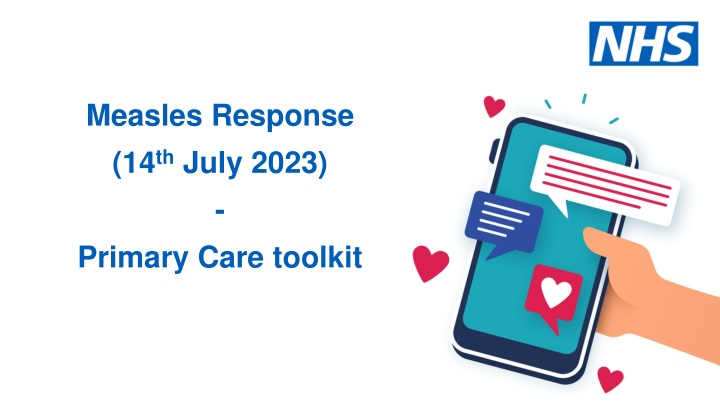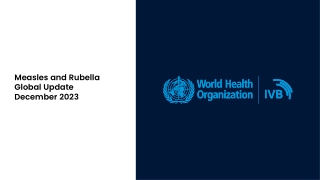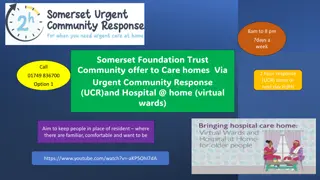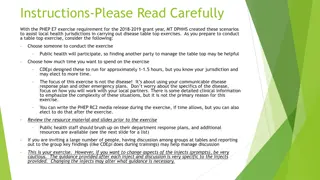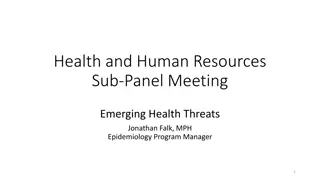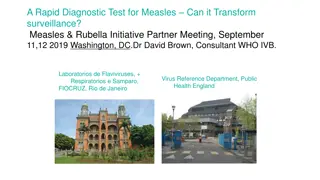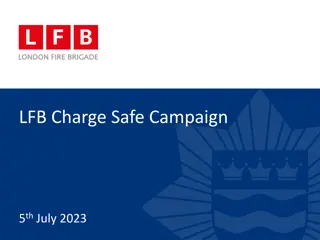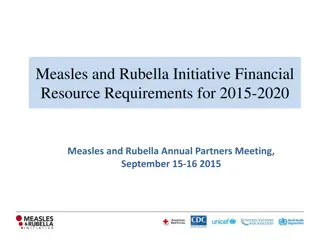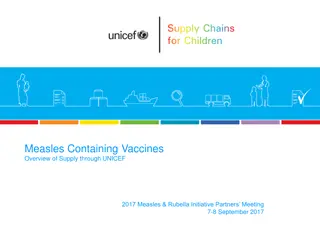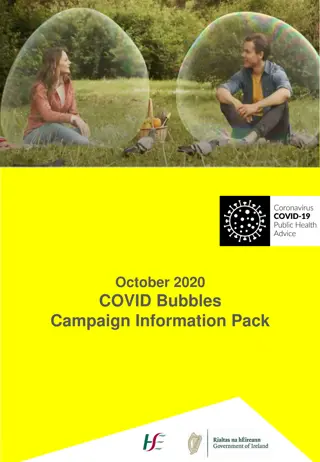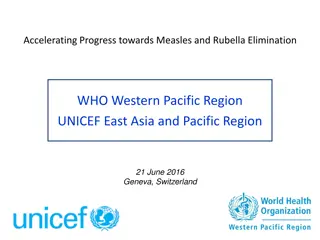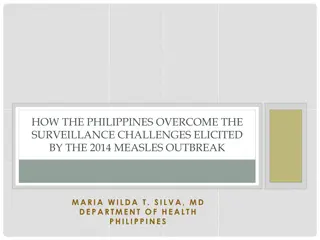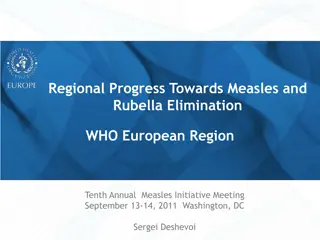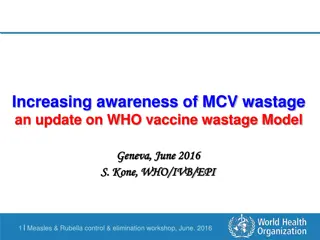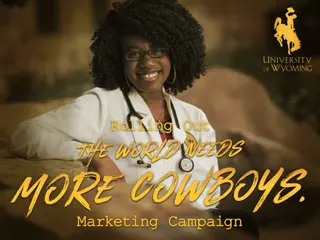Urgent Measles Awareness Campaign in Response to Rising Cases in England
Measles cases are on the rise in England, with a significant number reported in London. The vaccination rate is below the target set by WHO, posing a high risk of outbreaks. The campaign aims to increase awareness about the seriousness of measles, educate the public on the benefits of the MMR vaccine, and dispel myths about its link to autism. Key messages stress the importance of vaccination to prevent serious complications in children.
Download Presentation

Please find below an Image/Link to download the presentation.
The content on the website is provided AS IS for your information and personal use only. It may not be sold, licensed, or shared on other websites without obtaining consent from the author.If you encounter any issues during the download, it is possible that the publisher has removed the file from their server.
You are allowed to download the files provided on this website for personal or commercial use, subject to the condition that they are used lawfully. All files are the property of their respective owners.
The content on the website is provided AS IS for your information and personal use only. It may not be sold, licensed, or shared on other websites without obtaining consent from the author.
E N D
Presentation Transcript
Measles Response (14th July 2023) - Primary Care toolkit
What is the background? Measles cases are rising in England this year. There were 128 cases from 1st Jan 30th June, of which the majority were in London, this is not expected to be higher. The vaccination rate is lower than the 95% target set by WHO and as low as 60% in some areas of London. UKHSA have predicted that the risk in London is high this year and cases could rise to between 40k and 160k due to low uptake of the MMR and the number of cases being imported and spread. The overall risk to England is low, but there are cases of measles in every region and numbers are rising. UKHSA suggest that without intervention cases will continue to rise in all regions. UKHSA are publishing their ministerial submission and modeling paper outlining the risk of measles in England as low and London as high on 14th July 2023. It is expected to gain much press interest. NHS England are launching a measles awareness campaign on 14th July encouraging the uptake of the MMR vaccine. The purpose of this pack is to support communications between primary care and health care practitioners and their patients / public.
Objectives/Aims Increase the awareness of the seriousness of measles in the community. It is not just a rash and can make children seriously unwell. There is no medical treatment for measles. Educate communities of the benefits of the MMR vaccine to prevent children becoming seriously unwell. Inform the public that measles cases are on the rise in England and across Europe, encouraging the uptake of the MMR vaccine, especially before travel Where suitable, primary care and health care practitioners to educate patients that there is no link between the MMR vaccine and autism. (National Autism Society state on their website There is no link between autism and vaccines. ) Remind people the MMR vaccine needs 2 doses in childhood starting from 1 year old, including call / recall where possible. 3
Audience and insights Audiences General public (including parents/carers of pre- and school age children). Stakeholders Key stats and insights Over 1 in 10 children are unvaccinated and unprotected against Measles, Mumps, Rubella (MMR) in England Vaccination for MMR has been in decline for over a decade and is well below the 95% WHO target needed to achieve and sustain measles elimination and stop the spread of the disease London has an increased risk due to as low at 2 in 5 children unvaccinated and higher case numbers of measles this year All regions of England have measles cases The WHO has advised that measles cases are on the rise across Europe UKHSA modelling suggests London could sustain 40k 160k measles cases
Key messages General Measles cases are rising in England and across Europe Measles can make children seriously unwell with one in five needing a hospital visit One on 15 children develop serious complications from a measles infection, which can include meningitis and blindness There is no medical treatment for measles; vaccination is the best protection against becoming seriously unwell The Measles, Mumps and Rubella (MMR) vaccine is safe and has been used since the early 1980s. Over 20 million cases of measles have been prevented since the start of measles vaccination in the UK. Over 4,500 lives have been saved as a result (81 lives per year) *source is UKHSA blog. MMR vaccination is free on the NHS with the first dose being offered when a child is one and the second at 3 years and 4 months old. This provides long lasting protection against measles, mumps and rubella Vaccination is the best way to protect a child from becoming seriously unwell from preventable diseases such as measles The evidence is clear; there is no link between the MMR vaccine and autism Call to action for patients If your child has missed their first or second dose of MMR vaccine contact your GP practice to book an appointment. If you are unsure if your child is due a vaccination or has missed a vaccination, check their red book or contact your GP practice. For adults, it is never too late to catch up on their MMR vaccinations, contact your GP practice to book an appointment For more information visit the NHS website
Assets for use & sharing New social media assets have been created for this measles campaign and to support the UKHSA announcement. These can be found here. Please share resources with colleagues, local communications networks, community organisations for use National call / recall assets are available for use here including translated materials The latest MMR Top frequently asked questions are at the end of this pack to support teams with any questions patients may have on the MMR vaccine
Measles Oral testing In May UKHSA reshared the information on oral testing for measles identifying that it is essential for an oral fluid kit (OFK) is sent out to every notified case of measles, mumps and rubella, regardless of any other additional investigations ordered. It is a WHO requirement for at least 80% of all suspected cases to be confirmed or discarded. Form to complete for measles oral fluid testing kit is here Oral Fluid testing kit information for HCP is here How to take an oral fluid test is here Letter sent to patients here Video on how to take the test and further information can be viewed here 7
Primary Care requirements As set out in the Statement of Financial Entitlements (SFE) each MMR vaccine dose administered is eligible for an item of service payment, paid at 10.06 and should be recorded on the patients record for all doses, including the final dose. If a new or existing patient (child or adult) has an incomplete vaccination status and are outside of the UK routine vaccination schedule and / or has incomplete vaccination status, then they can be offered vaccination and where administered the GP Practice will be paid. Please can we ask that even if a new or existing patient has had vaccinations either abroad or in England that this is recorded on their GP record. This allows for accurate reporting of vaccination coverage figures at GP practices, Local Authority Level and across England. 8
Example social media posts Twitter Cases of measles are rising in England. Measles is more than just a rash with one in five children needing a hospital visit. Make sure your child is up to date with their MMR vaccination to give them the best protection again becoming seriously unwell. Find out more here. Facebook Measles cases are rising in England. Make sure your child is up to date with their MMR vaccinations. For more information visit nhs.uk/mmr Instagram Two doses of the MMR vaccinations can help stop your child becoming seriously unwell with measles. For more information on how to check your child s vaccination record, visit nhs.uk/mmr
Useful links Use your own social media channels and create your own posts or like and share social content posted from: Social Media Handles Weblinks NHS England Facebook account: @NHSWebsite Twitter account: @NHSuk NHS vaccination schedule Quarterly Childhood Vaccination Coverage 2020/21 (Source: Gov.uk) Department of Health and Social Care Facebook account: @DHSCgovuk Twitter account: @DHSCgovuk UK Health Security Agency Facebook account: @UKHealthSecurityAgency Twitter account: @UKHSA
Example copy This can be used as a basis for bulletins/websites/fact cards/ depending on your activity. Measles cases on the rise in England and across Europe. Make sure you and your family are protected against becoming seriously unwell with measles by checking you are up to date with the MMR vaccine. Across England, on average one in ten children are not up to date with their MMR vaccinations, with some areas of the country as low as two in five, putting thousands of children at risk of catching measles and the disease spreading in unvaccinated communities. Just two doses of the MMR vaccine gives you and your family lifelong protection against catching measles. The first vaccine is given at age one year an the second at age 3 years and 4 months old. If you ve missed any doses it s not too late to catch up. Contact you re GP Practice today to book an appointment to get up to date. If you are unsure if you or your child are up to date check your child's red book or GP records and make an appointment to catch up any missed doses. For more information on the NHS vaccination schedule, please visit.
MMR top FAQs What is the MMR vaccine? The MMR vaccine protects against measles, mumps and rubella which can be serious. MMR vaccination is offered to children at around 1 year of age, with a second dose at 3 years and 4 months. Both doses are required to offer full and lasting protection for your child against these vaccine preventable diseases. Your GP practice will invite you to arrange an appointment when your child is eligible for the vaccine. If your child is older and has missed the vaccine contact your GP practice to discuss and arrange an appointment to ensure they are fully protected. Are there any side effects with the MMR vaccine? The MMR vaccine is very safe. MMR vaccine is a live attenuated vaccine which means that it contains weakened versions of measles, mumps and rubella viruses. These have been weakened enough to produce immunity without causing disease. Most side effects are mild and do not last long, such as: the area where the needle goes in looking red, swollen and feeling sore for 2 to 3 days around 7 to 11 days after the injection, babies or young children may feel a bit unwell or develop a high temperature for about 2 or 3 days Some children might also cry and be upset immediately after the injection. This is normal and they should feel better after a cuddle. It's important to remember that the possible complications of infectious conditions, such as measles, mumps and rubella, are much more serious. Are there any circumstances that my child shouldn t have their MMR? Almost all children can be safely vaccinated with all vaccines. In general, a vaccine should not be given to children who have had a confirmed anaphylactic reaction to a previous dose of the same vaccine. While the MMR vaccine is safe for children with a severe egg allergy, you should let your doctor or nurse know if you or your child has had severe allergic reactions to gelatine, an antibiotic called neomycin, egg allergies. What is the consent process for vaccination? Parents, carers or those with parental responsibilities for young children should attend vaccination appointments with their child to give consent for them to receive vaccination. For looked after children, please refer to the care plan where permissions and restrictions of consent will be outlined. 12
MMR top FAQs How can my child get the MMR vaccine? The Measles, Mumps and Rubella vaccine (MMR) protects against these three potentially serious illnesses. With rates of measles cases increasing, vaccination is more important than ever. Two MMR doses are needed to give effective protection and will be offered through your child s GP practice. The first dose is given after your child s first birthday and the second dose is given at 3 years 4 months old or soon after to protect them before they start school. The vaccine is given by injection into the leg or upper arm. How does the MMR vaccine work? Your child s immune system responds to the vaccine by producing cells which recognise and remember each of the 3 viruses. If they are in contact with any of the diseases in the future, these cells will wake up and activate their body to rapidly produce antibodies. The vaccine is very good at providing protection against measles, mumps and rubella. Over 99% of those who have 2 doses of the vaccine will be protected against measles and rubella. Although mumps protection is slightly lower, cases in vaccinated people are much less severe. This protection is usually long lasting. Is the MMR vaccine safe? The MMR vaccine has been safely protecting children for many years in many countries worldwide. In the UK, millions of doses have been given since it was introduced in 1988. Before vaccines can be used, they have to be thoroughly tested for safety. Many studies have taken place to look at the safety and effectiveness of MMR vaccine. The evidence is clear that there is no link between MMR vaccine and autism. What if my child is ill on the day of the appointment? If your child is unwell with a temperature on the day of the vaccine you will need to rebook an appointment once your child is feeling better. 13
Measles top FAQs What is measles? Measles is an infection that spreads very easily and can cause serious problems in some people. Having the MMR vaccine is the best way to prevent it. Measles usually starts with cold-like symptoms, followed by a rash a few days later. Some people may also get small spots in their mouth. First symptoms, before ethe rash appears include Cold-like symptoms a high temperature a runny or blocked nose sneezing a cough red, sore, watery eyes Can getting measles, mumps and rubella be serious? Measles, mumps and rubella are highly infectious illnesses that can easily spread between unvaccinated people. These diseases can lead to serious problems such as meningitis and hearing loss. Most people are vaccinated against measles, mumps and rubella and since the vaccine was introduced in 1988, these conditions have become rare in the UK as the vaccine is good at providing protection. How can my child / how can I get measles? Measles is a virus that spreads through the air and is passed on by coughs and sneezes. Those who have measles are infectious before they have any spots. The virus is highly infectious and one infected person with measles will infect 9 out of 10 unvaccinated people if they spend 15 minutes of more with them. Is measles just a childhood disease? Measles is more common in young children, but anyone unvaccinated is at risk of getting measles and becoming seriously unwell. Is measles not just a rash that goes away? Measles can be serious and lead to long term health problems, such a blindness in rare cases. Most people who get measles feel very unwell for up to two weeks. There is no medical treatment for measles. One in five will need a hospital visit and one in 15 will have complications from getting measles. 14
